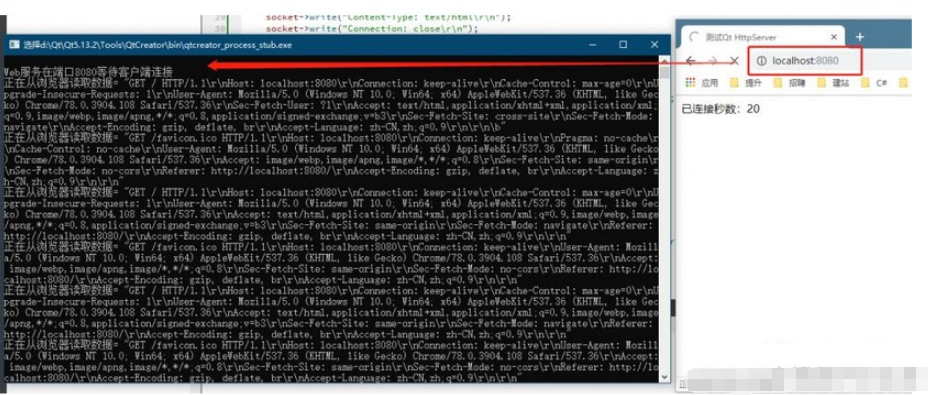本篇内容介绍了“Qt怎么实现http服务”的有关知识,在实际案例的操作过程中,不少人都会遇到这样的困境,接下来就让小编带领大家学习一下如何处理这些情况吧!希望大家仔细阅读,能够学有所成!
先看执行结果:

Qt HttpServer
左边是开启的Qt Http服务,监控服务端口,及接收客户端请求;右侧是浏览器访问服务。
下面是具体代码:
HttpDemo.pro
QT += core
QT += network
QT -= gui
CONFIG += c++11 console
CONFIG -= app_bundle
# The following define makes your compiler emit warnings if you use
# any Qt feature that has been marked deprecated (the exact warnings
# depend on your compiler). Please consult the documentation of the
# deprecated API in order to know how to port your code away from it.
DEFINES += QT_DEPRECATED_WARNINGS
# You can also make your code fail to compile if it uses deprecated APIs.
# In order to do so, uncomment the following line.
# You can also select to disable deprecated APIs only up to a certain version of Qt.
#DEFINES += QT_DISABLE_DEPRECATED_BEFORE=0x060000 # disables all the APIs deprecated before Qt 6.0.0
SOURCES += \
main.cpp \
myhttpserver.cpp
# Default rules for deployment.
qnx: target.path = /tmp/$${TARGET}/bin
else: unix:!android: target.path = /opt/$${TARGET}/bin
!isEmpty(target.path): INSTALLS += target
HEADERS += \
myhttpserver.hmyhttpserver.h
#ifndef MYHTTPSERVER_H
#define MYHTTPSERVER_H
#include <QObject>
#include <QTcpServer>
#include <QTcpSocket>
class MyHttpServer : public QObject
{
Q_OBJECT
public:
explicit MyHttpServer(QObject *parent = nullptr);
~MyHttpServer();
QTcpSocket *socket;
public slots:
void connection();
private:
qint64 bytesAvailable() const;
QTcpServer *server;
signals:
public slots:
};
#endif // MYHTTPSERVER_Hmain.cpp
#include <QCoreApplication>
#include "myhttpserver.h"
int main(int argc, char *argv[])
{
QCoreApplication a(argc, argv);
MyHttpServer server;
return a.exec();
}myhttpserver.cpp
#include "myhttpserver.h"
#include <QDebug>
MyHttpServer::MyHttpServer(QObject *parent) : QObject(parent)
{
server = new QTcpServer(this);
connect(server, &QTcpServer::newConnection, this, &MyHttpServer::connection);
if(!server->listen(QHostAddress::Any, 8080))
{
qDebug() << "\nWeb服务未启动";
}
else
{
qDebug() << "\nWeb服务在端口8080等待客户端连接";
}
}
void MyHttpServer::connection()
{
socket = server->nextPendingConnection();
while (!(socket->waitForReadyRead(100))); //等待从浏览器读取数据
char webBrowerRXData[1000];
int sv = socket->read(webBrowerRXData, 1000);
qDebug() << "正在从浏览器读取数据=" << QString(webBrowerRXData);
socket->write("HTTP/1.1 200 OK\r\n"); // \r needs to be before \n
socket->write("Content-Type: text/html\r\n");
socket->write("Connection: close\r\n");
socket->write("Refresh: 1\r\n\r\n"); //refreshes web brower every second.Request
socket->write("<!DOCTYPE>"
"<html>"
"<header>"
"<meta http-equiv=\"Content-Type\" content=\"text/html; charset=utf-8\" />"
"<title>测试Qt HttpServer</title>"
"</header>"
"<body>已连接秒数:");
QByteArray str;
static qint16 count; //用于在浏览器上显示的统计数字
str.setNum(count++);
socket->write(str);
socket->write("</body>"
"</html>");
socket->flush();
connect(socket, &QTcpSocket::disconnected, socket, &QTcpSocket::deleteLater);
socket->disconnectFromHost();
}
MyHttpServer::~MyHttpServer()
{
socket->close();
}“Qt怎么实现http服务”的内容就介绍到这里了,感谢大家的阅读。如果想了解更多行业相关的知识可以关注亿速云网站,小编将为大家输出更多高质量的实用文章!
亿速云「云服务器」,即开即用、新一代英特尔至强铂金CPU、三副本存储NVMe SSD云盘,价格低至29元/月。点击查看>>
免责声明:本站发布的内容(图片、视频和文字)以原创、转载和分享为主,文章观点不代表本网站立场,如果涉及侵权请联系站长邮箱:is@yisu.com进行举报,并提供相关证据,一经查实,将立刻删除涉嫌侵权内容。
原文链接:https://blog.csdn.net/m0_60259116/article/details/130115149